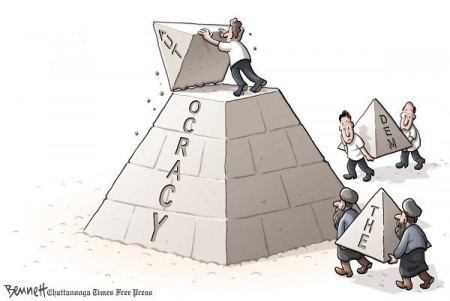
Much to the chagrin of Western governments, Egypt’s first elections since the overthrow of Mubarak’s regime in February are unlikely to yield a secular democratic government. Receiving an estimated 65 percent of total votes, Islamist parties consolidated their gains in Egypt’s second round of multistage parliamentary elections held on December 14-15, achieving yet another landslide victory that is unlikely to be reversed in the third and last round of voting in January. Although not fully surprising, the marginalization of liberal and secular forces at the ballots has caused notable uncertainty among Western states when it comes to formulating foreign policy options towards Egypt and the Middle East more generally.
Governments in both Europe and the US have been understandably reluctant to voice premature concessions in the face of a probable coalition government dominated by Islamist parties. To be sure, even though the Muslim Brotherhood and the Al-Nour Party, the political wing of the Salafi movement, do not share a fully congruent ideology, they are both in favor of implementing Sharia law. The dilemma is obvious even despite the political outcome in Egypt. What remains is great ambiguity in how political Islam would actually be implemented once the relevant factions seize power, and whether this would be compatible with the stipulations the revolution has fought for and, moreover, Western ideals of self-determination and human rights.
Up to this point, the West has shown full support for democratization efforts in the Arab world, going as far as providing military support in the case of Libya. For what it’s worth, the death of Muammar Gaddafi has left the country in civil-war-like conditions, with armed rebel groups fighting each other over power and influence. Syria is another illustration of Western confusion when it comes to foreign policy formulation. After the apparent failure of the observers mission sent by the Arab League, pressure is mounting on Western governments to go further than just condemning the violence.
A free and fair elected government in Egypt establishing a theocratic rule is likely to challenge Western notions of democracy and it is still unclear how new policies towards a non-secular regime will be formulated. In the face of a government that might not be bound by constitutional constraints, outrage is likely to be high among Western states in the case of human rights violations. Accepting that models of democracy can and will differ, the international community might reconsider raising efforts for the strengthening of universal principles and the enforcement of respective treaties. It will further need to be ensured that the secular forces that have once sparked Egypt’s revolution in the hope for freedom and equality are adequately involved in rebuilding the country’s institutional setup. Measures to include minorities in the drafting of the constitution will be crucial considering the continuous eruption of violence between Egypt’s Coptic Christians and its Muslim population.
Concerning impacts on the region more generally, fears are great about the new Egyptian leaders not being willing to adhere to the peace treaty with Israel, let alone guarantee a stable Sinai Peninsula or secure borders. Such developments could further contribute to the destabilization of the Middle East. Strengthening ties between Egypt and Palestinian factions and the threatening aspect of an Islamist government for Israel could present an obstacle to more stable conditions in the region.
However, the political outcome in Egypt is not yet carved in stone. Confusion about the highly complicated election procedures renders the factual distribution of seats within the new Egyptian parliament unclear. Moreover, the legitimacy of the newly elected parliament to draft the country’s constitution has already been contested by Egypt’s military leaders, who have announced the establishment of a military council to be tasked with the supervision of the process. Recent upheavals against the interim military rulers have shown that setbacks could prove to be an inescapable part of Egypt’s revolution and hence, its “success” is far from assured at this point. In any case, Western policy makers will need to be prepared for whatever form of government Egyptian citizens decide upon.

